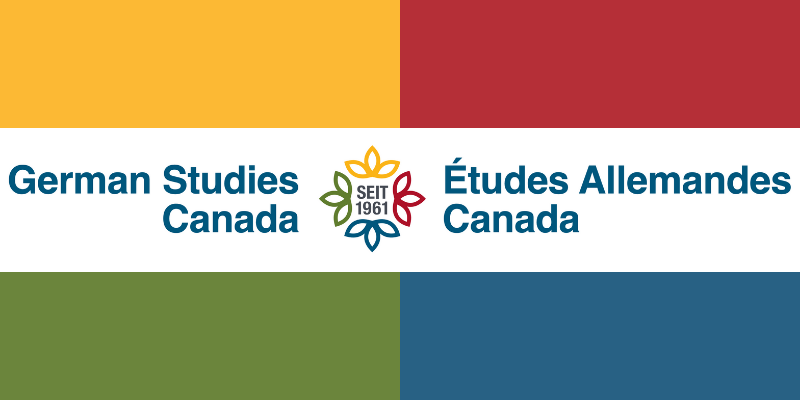May 15-17, 2022
Extended Submission Deadline: Monday, January 17, 2022
You are invited to submit proposals for papers to be delivered at the virtual annual meeting of German Studies Canada at the Congress of the Humanities and Social Sciences of Canada hosted as an online-only event. While the Federation is still finalizing the choice of hosting institution for the Congress as a whole, we are already posting the GSC call for papers so that potential participants can mark their calendars with upcoming deadlines and the future conference date. Papers presenting original, unpublished research on any topic or period of German-language literature, cinema, cultural studies, German language and language pedagogy are welcome, in English, French or German. We also welcome proposals in related fields (e.g., anthropology, art history, Black studies, diaspora and transnational studies, education, environmental humanities, history, musicology, philosophy) provided they are related to topics in German Studies. Papers or pre-constituted panels on Black German Studies are especially welcome, and will be vetted in consultation with the BGHRA (Black German Historical Research Association).
You may submit a single paper or panel proposal:
- Single paper proposals: maximum 350 words.
- Panel proposals: panels of two or three papers on a related theme are welcome. The panel organizer should submit a proposal explaining the theme as well as the proposals for the individual papers as a package. Maximum 1,500 words. The panel proposals will be assessed on their merits as a panel separately from the single paper proposals.
In 2022, the Federation remains committed to the themes of equity, diversity, inclusion, and decolonization. Possible lines of inquiry for German Studies might include, but are by no means limited to the following:
- Which specific forms of knowledge about (post)colonialism are being produced in German-language literature and culture?
- Which specific forms of knowledge about “the North” as it relates to reconciliation, governance, social justice, climate change, reciprocity, or education are being produced in German-language literature and culture?
- How are recent public debates and memory battles about social justice reflected in Germany’s current memory culture?
- What does German Studies “know” about racism? How is racism in German-language literature and culture voiced, challenged, or subverted? Which forms of racism are especially prevalent, and where does German Studies suffer from blind spots when it comes to racism?
- How can we, as scholars of German Studies, address colonial legacies and racism (in organizations, institutions, our community)? How can we learn from other disciplines and discourses? To what extent can such inquiries help reframe disciplinary, geopolitical, and national thinking and boundaries?
- How can German Studies contribute to overcoming the divisive legacy of colonialism and promoting reconciliation between Indigenous peoples and settler populations?
A copy of your proposal should be emailed to the program co-chairs no later than Monday, January 17, 2021. Proposals are to be submitted electronically as a Word document, PDF or .rtf file. An adjudication committee will assemble the program following blind and anonymous review. The author’s name should not appear on the proposal itself. Please include your university affiliation and contact information in the accompanying e-mail. Decisions will be announced by January 30, 2022.
Presentation time at the conference is limited to 15 minutes per paper. Primary sources in German should be quoted in the original language. Papers will be given as part of so-called ‘simu-live’ sessions, which were positively received at the 2021conference:Presenters will be expected to pre-record their paper and upload it prior to Congress to the virtual event platform. These sessions will start with a brief live introduction by the panel chair, followed by the activation of the pre-recorded presentations, and end with a live Q&A discussion. Plenaries and Keynotes will be conducted live, online. Further details will be available closer to the conference. Please contact us if you have any questions on the delivery format of the conference.
GSC meets as part of the annual Congress of the Humanities and Social Sciences of Canada organized by the Canadian Federation for the Humanities and Social Sciences. The largest multidisciplinary meeting in Canada, the Congress hosts the meetings of more than 70 scholarly associations during a 7-day period, bringing together scholars from across Canada and around the world.
Seminar Graduate Students Award: Both Graduate students and underemployed scholars selected for presentation are eligible to receive a Conference Registration Subsidy Award generously provided by the journal Seminar.
Please note that presenters must be paid-up GSC members by 15 March 2022. Presenters on joint panels with other scholarly organizations in the Canadian Federation of the Humanities and Social Sciences must be paid-up members of either GSC or the co-sponsoring organization.
Submissions and inquiries should be jointly addressed to the GSC Program Co-Chairs:
Prof. Angelica Fenner (University of Toronto)
Email: angelica.fenner@utoronto.ca
Prof. Ann Marie Rasmussen (University of Waterloo)
Email: amrasmus@uwaterloo.ca
 Department of Germanic Languages & Literatures University of Toronto
Department of Germanic Languages & Literatures University of Toronto
